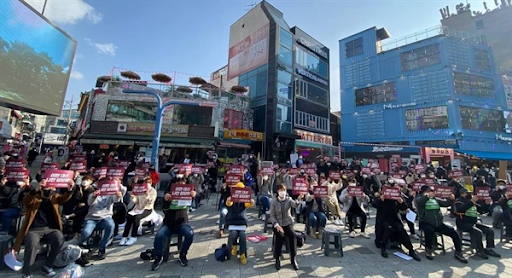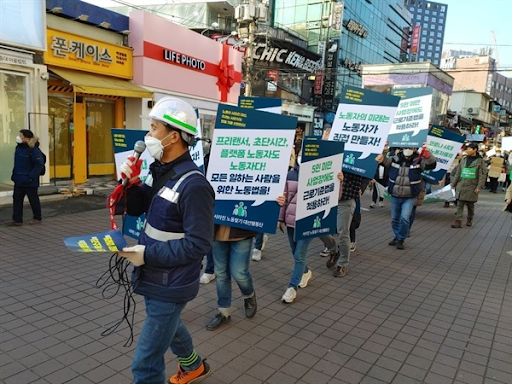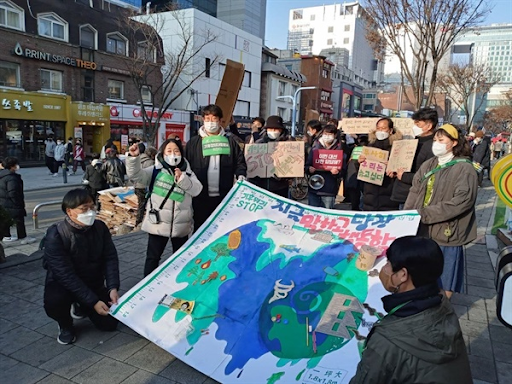“Rekindle the Candlelight!” - South Koreans Rally to Revive Their Political Revolution
On Mar. 1, 1919, Koreans poured out into the streets to protest brutal colonial occupation. The entirety of the Korean peninsula had been sold off to Japanese imperialism by the corrupt collaborators in Korea's ruling class, with its land and resources plundered and its sovereignty destroyed by guns and bayonets. The March 1st Movement remains in the heart of the Korean people as an example of the people rising up to reclaim their community even in the face of despair.
103 years later, south Koreans rallied once again to carry on the spirit of their historical struggles. Student groups, women’s organizations, community organizations and art collectives across Seoul came together to organize the 2022 Joint Electoral Action to Change the World. Their first event, the March 1 Political Party, was part protest and part festival, with songs, dances, and other performances and a march. The movement channeled the people’s frustration with the upcoming Presidential Election.
The Presidential Election is mere days away, but voters show neither excitement nor have any expectations. They are nothing but frustrated. There is no concrete vision for the nation; candidates are preoccupied with mud-slinging at each other on corruption allegations. This is the sad reality of the south Korean political scene today. Only 5 years ago, the entire country had been ablaze with the hopes and passion of the Candlelight Revolution. Today, little, if any, of that passion remains.
While the 2016 Candlelight Revolution ousted the corrupt Park Geun-Hye regime, it remained an incomplete revolution with the liberal administration that replaced the Park presidency doing little to uproot the established power structures. Aided by corporate oligarchs and the conservative media, the reactionary political establishment bid its time to simply rear its head once again. The Candlelight Revolution’s demands—increased mass participation in politics, more robust labor rights, a comprehensive anti-discrimination law, peace in the Korean Peninsula—remain unfulfiled.
Instead, many progressive voices across society have been silenced, isolated and demonized by the press. The political establishment and its presidential candidates pay no attention to workers killed by industrial accidents, women suffering from gender-based violence, an LGBT community suffering from harsh discrimination, and the disabled whose basic rights have been curtailed. The Joint Electoral Action movement began in order to take the people’s demands to the streets, rather than relying on politicians to speak for them.
Laborers marched with their hard-hats and work vests as they demanded legal protection against layoffs and workplace accidents, crying “Our sacrifice must not be taken for granted! We are not single-use!”. South Korea has the highest working hours among the OECD nations, with working conditions worsened by the pandemic. However, few, if any, of the presidential candidates discuss strengthening protection for workers and preventing workplace accidents.
The discourse surrounding the upcoming election seems to have regressed compared to previous elections. The members of the Seoul Women’s Association point out that in the 2017 Presidential Election, candidates, fearing the growing movement, claimed to be feminist. The women’s struggle in Korea exposed sexual violence through the MeToo movement and achieved decriminalization of abortion. Today, they declared “it is time for women to rise up like wildfire once again!”
The marching students called for the universities to lead the spirit of the time, rather than being glorified vocational training centers. They refused to be used as pawns by politicians as part of a rhetoric of hate and division. Instead they demanded the five basic rights to: not be killed at work, not be discriminated against, grow old and die in dignity, receive equal education, and live in their own homes without worrying about rent. They are concerned with the housing crisis, the insufficient labor rights, and the glaring non-existence of a comprehensive anti-discrimination law. Another chief concern is climate change, as the youth will be left to bear the brunt of the crisis.
A representative of the Climate Justice Action Group points out that the climate crisis has its roots in the inequality of capitalist production. “The Chairman of Samsung Group spends 20,000,000 Won (approximately 1,7000 USD) in electricity every month at his mansion. Meanwhile, 200,000 households around Korea have no access to electricity because they can’t afford to pay the power company. Are they all equally responsible for the climate crisis?” he asks. The inequality that produces the climate crisis is not only between the capitalists and the workers, or between humanity and nature, but also between the global north and the global south. “In the United States, every person emits 16 tons of carbon dioxide every year. In Ethiopia, it’s only 0.14 ton every year. Are they equally responsible for the climate crisis?” he asks.
The frustration of these various groups are not only directed at the politicians but also to the social movements themselves. Progressives must also take responsibility for the failure of the Candlelight Revolution and this presidential election, the worst in recent Korean history. The gathered activists and organizers agree that they need to engage in meaningful self-criticism and self-reflection to revitalize progressive social movements and reclaim the sovereignty of the people.
The Joint Electoral Action to Change the World is paving the way for that engagement. Rather than simply critiquing the electoral process and its candidates, it shines light on the concrete, material issues in Korean society, and calls for the people to take actions beyond the ballot box.
The candlelight has been flickering, but there are people fighting to keep its flame alive, so that the fire may rise again. The event concluded with a declaration:
"We commit ourselves to the following:
First, to rekindle the fires of the Candlelight Revolution.
The main objectives of the Candlelight Revolution, such as increased mass participation in politics, eradication of corporate political lobbying, reforms of megacorporate conglomerates, realization of basic labor rights, peace in the Korean peninsula based on denuclearization and the formal end to the Korean War, a comprehensive anti-discrimination law and a thorough investigation of the Sewol ferry disaster for a safer society, are still far from being achieved.
We commit ourselves to rekindle the passion for all these goals.
Second, to revive the silenced voices.
The voices of workers killed by industrial accidents, intellectuals criticizing the political establishment, victims of sexual violence who are unprotected, vulnerable minorities who are exposed to oppression have been silenced.
We commit ourselves to revive and amplify those silenced voices.
Third, to reclaim a future to build with our own hands
We want a future with a fundamental solution for climate change, a future without gender discrimination, a future where all workers are protected by law, a future without fatal accidents, a future that guarantees everyone the right to housing, a future that guarantees the disabled all rights, a future where everyone can get the treatment they need without worrying about the cost, a future where all political power fears the people. This future has been taken from us.
We commit ourselves to reclaim a future for our society.
March 1, 2022
Joint Electoral Action to Change the World



